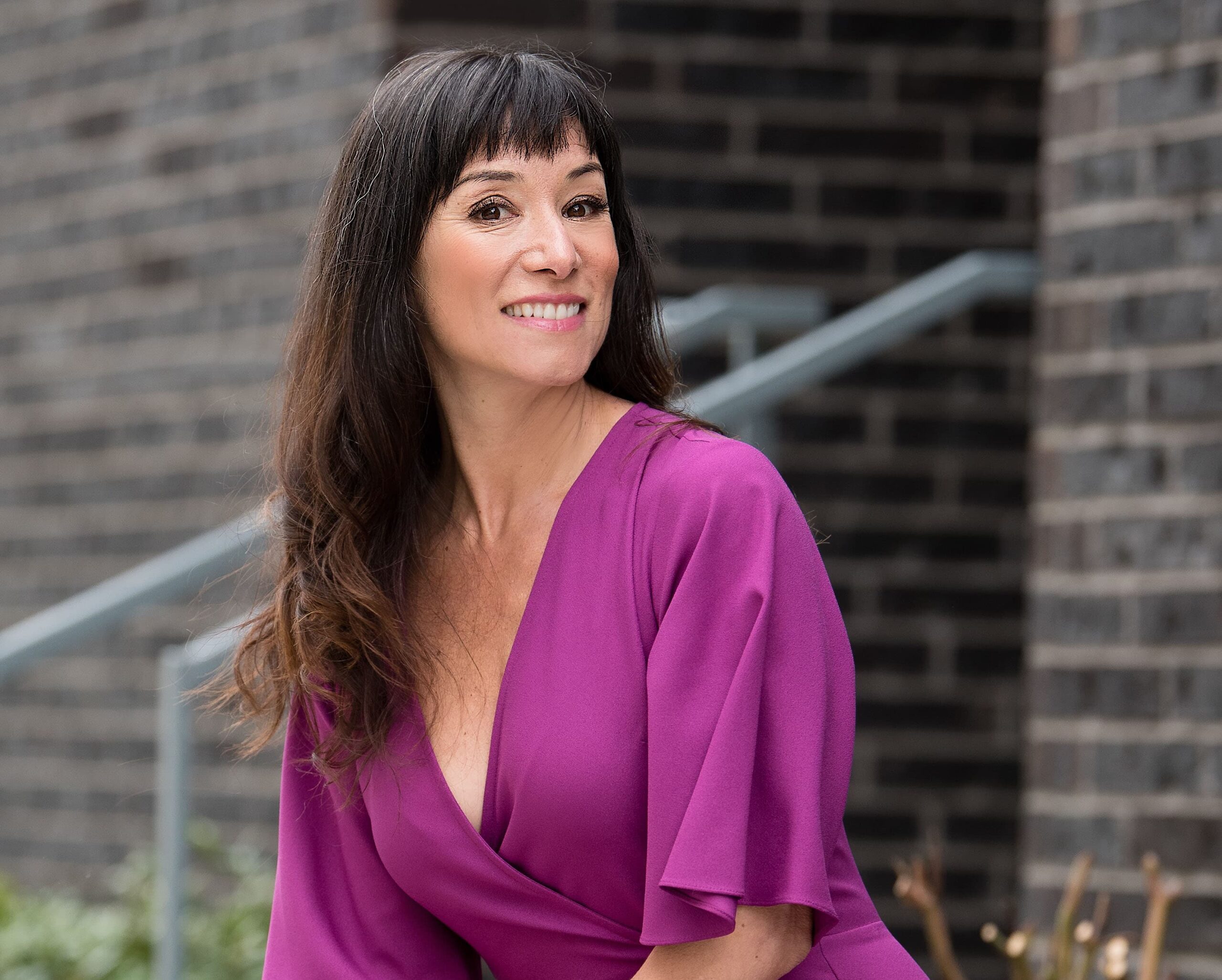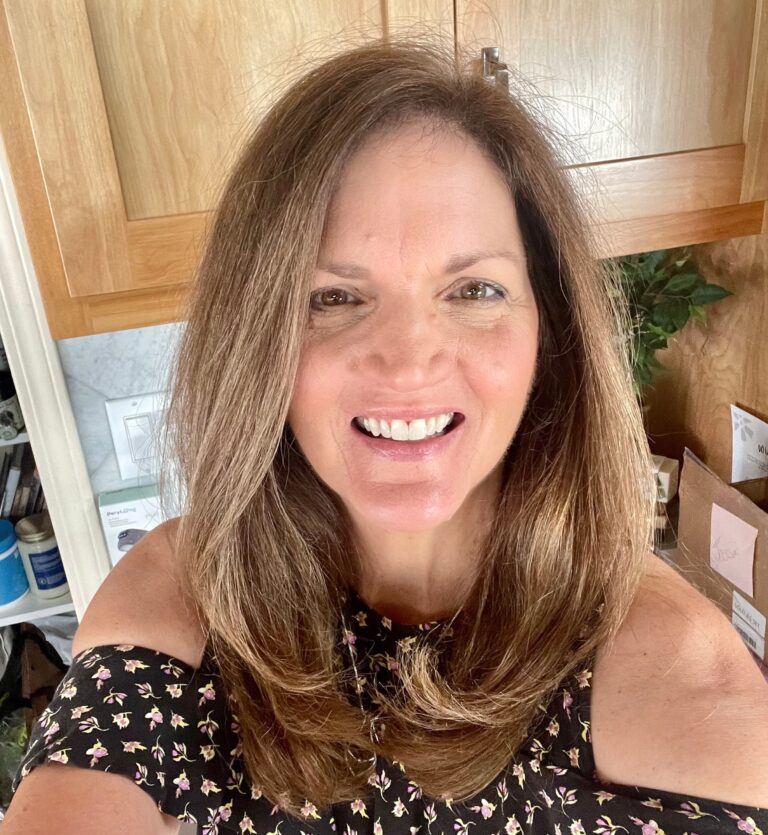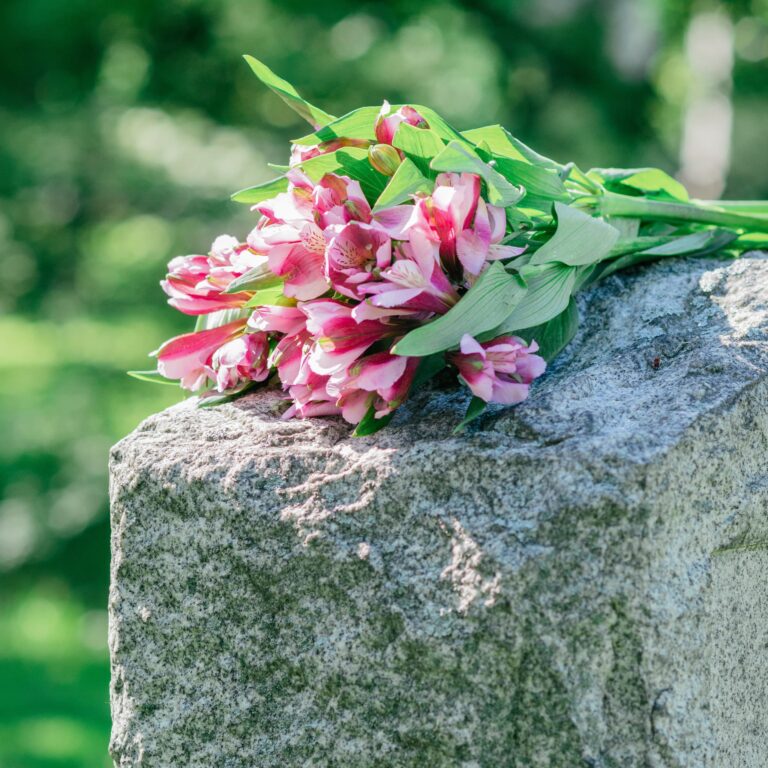Michelle Collins Shares Her Experience as a Suicide Loss Survivor
I had the privilege of chatting with Michelle Collins, a widow, author, grief and wellness coach, and yoga therapist. Michelle’s story is one of resilience, self-discovery, and finding purpose in the face of unimaginable loss.
Michelle’s journey began when she married her second husband, Glen, after a whirlwind romance. Together, they faced the challenges of merging their families and navigating the complexities of step-parenting. But tragedy struck when Glen started experiencing severe mental health issues, eventually leading to his heartbreaking death by suicide in April 2016.
In her books Surviving Spouse or Partner Suicide Loss: A Mindful Guide for Your Journey Through Grief and Supporting a Survivor of Spouse or Partner Suicide Loss: A Mindful Guide for Co-journeying through Grief, Michelle shares her personal grief journey and how she struggled to cope with the overwhelming emotions that came with it.
Michelle’s books on suicide loss are a valuable resource for anyone dealing with the aftermath of spouse suicide and for those supporting the grieving.
Listen to the Full Episode
Links + Resources From This Episode
This post contains affiliate links. Please read our affiliate policy for more information.
- TAPS – Tragedy Assistance Program for (Military) Survivors TAPS: caring for the families of America’s fallen heroes
- Finding Meaning: The Sixth Stage of Grief by David Kessler of grief.com
- Michelle’s book: Surviving Spouse or Partner Suicide Loss: A Mindful Guide for Your Journey Through Grief
- Michelle’s book: Supporting a Survivor of Spouse or Partner Suicide Loss: A Mindful Guide for Co-journeying through Grief
Episode Transcript
Melissa: On this week’s episode, we are chatting with Michelle Collins. Michelle is a widow, an author, a grief and wellness coach, and a yoga therapist. And I want to dig into all of that.
But, first, please share a little bit about your widow story.
Meeting and Marrying Her Second Husband
Michelle: Sure, thanks Melissa for having me.
I married my second husband, Glen, after knowing each other for just 90 days. It was both our second marriage, and we fell in love passionately. He proposed to me a week after we met, which was incredibly fun, joyful, and amazing. We faced challenges in merging our families as he had three kids and I had three kids. At one point during our marriage, there were six teenagers in one house, although not all of them were there at the same time. There were episodes of five or four, which was quite hectic.
About a year and a half into our marriage, Glen started experiencing severe mental health issues. Sadly, in April 2016, he died by suicide. It was a life-altering event for me.
Afterward, I underwent a significant transformation, reevaluating my life and putting my limited energy into healing. I discovered my ability to support others in their healing journey. Prior to Glen’s death, I was already a wellness coach and yoga therapist. I have always been a lifelong learner, accumulating numerous certifications and reading countless books. My thirst for knowledge is insatiable.
In February, I will begin a two-year mindfulness meditation teacher training program to deepen my understanding. Although I already teach mindfulness meditation, I yearned to delve further into the practice.
Melissa: Certainly, you have delved deeper.
Let’s discuss Michelle 2.0 and the journey leading up to that point.
Could you please walk us through the six months to a year following Glen’s passing? We’re interested in how you reached the stage where you are now, helping and supporting others, and writing books. If you’re comfortable, please share the story of your journey to Michelle to Michelle 2.0.
Supporting Survivors of Spouse or Partner Suicide
Michelle: I’d like to share this because it may be helpful to others. The first six months were incredibly challenging. The pain I experienced and the difficulties in the environment were beyond belief. It felt like I was grieving two things simultaneously: Glen’s death and everyone’s reaction to it. I lost friends, and I’m sure many of your listeners have also experienced strained relationships that hinder their healing process. When someone passes away, everyone is under immense stress and pressure, often not behaving at their best. Finger pointing, guilt, anger, and a lot of “shoulda coulda woulda” occur.
Melissa: Insensitive comments, probably.
Michelle: The presence of insensitive comments, possibly numerous, combined with the attached stigma surrounding suicide, contributes to an exceptionally traumatic period. Following approximately three or four months, I experienced the onset of PTSD, marked by distressing flashbacks, dissociative episodes, and considerable difficulty in engaging in activities I knew would be beneficial, such as yoga, breathing exercises, and mindfulness.
Melissa: Because you possess the role of a healer and you are genuinely aligned with that path.
Michelle: The pain overwhelmed me, leading me to seek solace in drugs and alcohol. I indiscriminately consumed any substance offered by others, driven by my desperate desire to escape the agony I was enduring.
Melissa: Understandable. If you wish to exclude it, simply close it off. Avoid any emotional response.
Michelle: I couldn’t do it. Glen and I were big partiers, going to concerts and stuff like that. It was really fun, that was the life I had.
About six months after he died, I started getting really sick due to poor choices. A friend of mine, the guy who introduced me to Glen, came to visit. He had a vested interest in my healing and some guilt. He threatened to put me in rehab because I was using so many chemicals for self-soothing. At that time, my original therapist had sent me to a trauma therapist. I felt abandoned by my first therapist and was in a dark place. I didn’t want to meet someone new and talk about the suicide. The first six months were tough, but then I started seeing the trauma therapist and gradually reduced drug use with her help. I also discovered mantra meditation.
Another friend, whose husband died by suicide, called me for help. Even though I was unsure about my ability to assist her, we had a conversation. All these things together set me on the path to healing. Let’s take a quick break.
Melissa: Because when you spoke to your friend whose husband died by suicide, did you realize that you possessed wisdom or the ability to offer assistance? Did you feel a spark of inspiration, prompting you to consider doing something about it? Was this the catalyst that led you to pursue a grief coaching certification and write your books?
Michelle: The occurrence of this event was rather indirect, taking a convoluted path before reaching its culmination, right?
Melissa: The following day does not reflect the same sentiment. It seems implausible, doesn’t it? Not the next day.
Michelle: That was the initial sign for me that my experience could be utilized for positive purposes. It wasn’t merely a situation where my life turned into a nightmare after my husband’s suicide, with loved ones refusing to communicate and my social life in ruins due to various unfortunate events. It marked the beginning of my realization that I could potentially employ my abilities and background to assist others. Indeed, the books I am currently working on will indeed be published, right?
Melissa: They will, as I have already read an advanced copy. Thank you for providing such an amazing experience.
Michelle: They didn’t truly come from my heart, as it wasn’t altruistic to assist people. I intend to write a book because it’s challenging when you’re narrating your own story. Different authors have varied experiences. Some authors complete a novel within three days, while others struggle with a book for many decades. Writing a book is a difficult task, lying somewhere in between. However, something significant happened on the day when I scattered Glen’s ashes, a year after his passing. I had done it a few times before, but that particular day, my heart was wide open, and I felt an intense connection to him and nature. I was on a beach in Hawaii, a place we had spent time together, when I received a message from the universe. People often talk about receiving signs and such. I heard a voice that instructed me to write a book on surviving a spouse’s suicide. This occurred in April of 2017, and the book, which has now evolved into two books, was finally published in January of 2023. The journey to get these books published has been long and winding.
Melissa: You have actually written not just one book, but two books. I had the opportunity to read your book on surviving the loss of a partner due to suicide. However, I haven’t read the companion book yet. Could you briefly share with us your motivation behind the decision to create two books instead of one?
Michelle: It was a message I received, and I was irritated. The night I turned in the manuscript to the publisher, where I signed off on it, marked the transition into the design and formal editing process. Afterward, I went to bed, relieved that it was no longer my responsibility. However, before I even fell asleep, that familiar voice, whether it be from God, the universe, or my spirit, urged me to write a companion guide. The next morning, I immediately reached out to my publisher and informed her of my intention to create a companion guide. She agreed, understanding the reasoning behind it. The motivation to heed that voice was clear to me. As I mentioned earlier, a significant portion of the pain and trauma stemming from Glen’s death arose from the aftermath. People surrounding me didn’t know how to handle the situation, often behaving insensitively, despite their inherent goodness. This book aims to provide guidance for those supporting individuals affected by suicide.
Melissa: I experienced goosebumps when you mentioned that.
Finding Support and Community: Overcoming Disenfranchised Grief
Melissa: It’s important to pay attention to such physical responses. It’s because when you go through a difficult time, you not only deal with the primary losses, but also secondary losses. These secondary losses include losing the support of family members and close friends, which can be quite challenging. Even though I can relate to pain, loss, and grief, I’m not sure how I would handle it. I might end up fumbling for words or making insensitive comments. It’s a difficult situation where people either say the wrong things or say nothing at all.
Michelle: Now that I’m moderating grief groups, I see that it wasn’t just me. Many of the grievers I assist face a double whammy, an insult to injury, particularly widows. The in-law family often struggles with knowing how to navigate the situation. Are you still considered part of our family, or have you been excluded? After all, our child or sibling is no longer with us. So, who are you? And for the former spouse, our connection has vanished.
Melissa: Glen connected you with his family, right?
Michelle: I believe it’s a complex situation where people struggle to know what to do. Many widows I’ve spoken to have experienced being ignored by their in-laws, which adds to their grief. It’s a significant additional loss. It’s truly saddening because suddenly you find yourself alone during the holidays. You not only lose your spouse, but your extended family also distances themselves. It’s truly heartbreaking, a double blow.
I’m glad you had messages and support to split your book into two separate books. When I read your book, your story was interspersed throughout and served as a guidebook with practical steps and instructions. It allowed me to understand your journey and provided actionable steps to move forward in life. I found it incredibly helpful.
Michelle: Thank you for your kind words. I believe that effective methods of practice, along with experiential activities, can aid in recovering from grief. Education is also crucial, as it helps individuals comprehend the normalcy of their emotions during such a challenging time. Grief is akin to an emotional injury, affecting the heart and one’s overall emotional well-being. Just like you wouldn’t be expected to go hiking a week after breaking your leg, attending a party shortly after the loss of a spouse is not a reasonable request. It is important to understand that healing from grief is a process that requires time and effort, and simply going through the motions of daily life does not equate to being fully healed. Taking the necessary time to heal is essential in order to reclaim a fulfilling life.
Melissa: That’s a profound statement because the injury remains invisible. We’re unable to visually perceive the scar or the broken leg, among other physical signs. Countless individuals silently endure profound emotional anguish. It was eloquently articulated.
Michelle: Thank you. I actually write poetry, and one of my poems addressing this situation is titled “I Wish I Had a Body Cast” to portray my pain for others to witness.
Melissa: Goosebumps. Impressive. I’d love to read that poem.
Michelle: I will retrieve the poems that I had considered incorporating throughout the book, perhaps as an introduction to each chapter. However, these poems seem distinct and disconnected from the rest of the content. This marks the third Poetry Sunday.
The Power of Yoga Therapy and Coaching in Grief and Wellness
Melissa: The third one is what you mentioned. You facilitate grief groups, right? Are you still actively involved in yoga therapy and coaching for grief and wellness?
Michelle: Yoga therapy is a versatile approach that aids in recovery from injuries or illnesses. It caters to individuals at any level of yoga practice. Some participants in my group classes, despite being in wheelchairs, actively engage in yoga. Regardless of one’s physical condition, yoga promotes overall health and well-being by supporting the nervous and immune systems. It can even be practiced in bed. Personally, I used yoga therapy to assist a person in their recovery from a motorcycle accident. Initially, they were completely immobilized, but through consistent effort and incorporating other modalities, within a few months, they were able to walk again—a truly remarkable transformation. What sets yoga therapy apart is its consideration of the emotional state of individuals. Sessions are tailored to promote calmness for those with anxiety and offer invigorating breathing techniques and poses for those experiencing depression. It differs significantly from attending a yoga class at the gym. I believe attending such a class can be beneficial, as long as it aligns with one’s individual needs and abilities. Additionally, yoga therapy incorporates coaching and modifications for grief support.
Melissa: Meditation or using big words facilitation.
Michelle: I participate in moderation, specifically through David Kessler’s grief.com group called Tender Hearts. This group is highly recommended for anyone in need of a grief support system. They embrace all individuals who are grieving, which is crucial because sometimes you may experience what is known as disenfranchised grief. This occurs when you lack a community of people with whom you can share your grief. For instance, if you have lost a friend, cousin, or pet, or even if you are estranged from a living friend. This organization provides a valuable space for those who feel excluded due to family dynamics or separate social circles, such as work colleagues. It’s worth noting that all the moderators in this group have undergone David Kessler’s grief educator training. David Kessler himself has collaborated with Elisabeth Kubler Ross on the stages of death and grieving.
Melissa: I believe he has written multiple books as well.
Michelle: His latest book is titled Color. It appears that he may have another book coming out soon, titled Finding Meaning.
Melissa: We discussed this topic in The Widow Squad during our book club meeting yesterday. We were specifically discussing books we would like to read once we complete our current book. This particular book was among the suggestions.
Michelle: It’s an outstanding book with numerous post-its marking pages. It has greatly influenced my work.
Melissa: Could you share what support you found most helpful? Additionally, I’m interested to know what you felt was missing or lacking in terms of support. Was there anything you wished you had more of?
Michelle: That’s all covered in the second book, right? It focuses on supporting survivors of spouse or partner suicide. The list of challenges seemed endless, but what I needed most was self-compassion and compassion from others. Emotions ran high, with a mix of crying, anger, and disbelief. Unfortunately, many people said the wrong things. Looking back, I did receive a lot of support. During those initial weeks, a friend started a GoFundMe campaign. Most of the funds went to his first wife and kids, which was appropriate. I received a small amount for groceries and necessities. Additionally, I sought help from organizations like TAPS, which assists individuals who have lost loved ones in the military. Klein, my spouse, was military or former military, so it was relevant. There was also a local organization called Returning Veterans Project, although I didn’t discover them immediately. In the immediate aftermath, it was my friends who were there for me. They were incredibly supportive and helpful. My two daughters were especially supportive, always by my side, answering calls, and helping me with tasks like visiting the funeral home. Initially, I couldn’t drive, so they took care of transportation.
Melissa: You shouldn’t be behind a vehicle because they’re causing it. No, absolutely, it’s as if nobody should be driving in this situation.
Michelle: I struggled to put my socks on and even get out of bed, let alone accomplish anything. Fortunately, I received valuable assistance during the initial weeks, and I organized a memorial service in his honor. However, support gradually faded away, as is often the case. The flip side is that grief doesn’t dissipate when people resume their lives; in some ways, it actually intensifies. In my book, I strongly advocate for consistent check-ins. It doesn’t simply vanish, especially during significant milestones like birthdays, anniversaries, and holidays. The impact is particularly pronounced on those occasions and persists with each subsequent year. Therefore, regular support is crucial. Six weeks is insufficient; it’s merely a fleeting period. If I had someone knowledgeable and compassionate, they could acknowledge his birthday with a thoughtful card, knowing that I’m remembering him. These gestures and similar acts are an annual occurrence, an ongoing process that doesn’t come to an end.
Melissa: That’s incredibly supportive. It would be beneficial for everyone attending a memorial service to receive a copy of the companion guide. It allows them to navigate through the contents, especially when they’re at a loss for words. They can refer to specific sections, perhaps page 59, or simply be more informed. It’s remarkable that you can return to your “normal” life, while the person who remains is still enduring profound pain.
Michelle: If you invest effort, every life challenge can be viewed as an opportunity for growth. I share an illustrative story in my book from my own experience. When I was 10 years old, I fell off a swing set and cut my leg on an exposed bolt. The plastic bolt cover was missing. The cut was significant, a couple of inches long, reaching down to the bone—a rather gruesome sight. I felt extremely upset because it was my first time needing stitches, and the idea scared me. At the age of 10, I was quite small, and even now, I’m not very tall. However, my shin has likely doubled in length since then, or at least come close to it. Although the scar is still visible, it now occupies a smaller portion of my leg. This visual serves as a representation of how grief affects us. The scar tissue remains unchanged; it does not grow. Yet, we, as individuals, change and grow. We construct a new life after experiencing loss, understanding that the loss will always be a part of us. Similar to my scar, it remains on my leg, but I have grown around it. I have learned to embrace and appreciate it. In fact, I have developed an affection for scars because they signify our resilience, our ability to endure, evolve, and embrace our true selves.
Melissa: You’re not only taking the next step of helping others move through it. It’s truly beautiful, a great visual.
Michelle: Thanks. I believe that not everyone feels the same way, but personally, if I can be present with grief and support others in their grief, it’s important for me to do so. It’s not an expectation for everyone else, as everyone finds meaning in their loss differently. It could be as simple as finding a reason to smile each day or finding the strength to get out of bed. It could also mean being compassionate towards oneself and acknowledging their emotions, as it adds value to one’s partner’s life meaning.
Melissa: Just doing your best in that moment, I really enjoyed our conversation. It’s great that we live in the same city. It’s been really cool to meet you both virtually and in person. So, what’s going on that’s really good right now? Also, where can we find you?
Michelle: What’s currently happening is quite positive. At the moment, I find it challenging to focus on anything other than my books. However, I also have clients whom I assist with various challenges, not just grief. I provide healing tools such as mindfulness, yoga, and breathing techniques to help individuals navigate difficult times and enhance their resilience. This way, they can better cope with future challenges. Sharing these practices and tools feels incredibly fulfilling within my world. Apart from working with private clients on yoga therapy, I still teach a few online yoga classes, which is quite enjoyable. For more information, you can visit my website, inhabitjoy.com. Additionally, you can find me on social media platforms such as Instagram, Facebook, and LinkedIn.
Michelle: I have an Amazon author’s page showcasing two books released on January 26. Apart from those, I have contributed chapters to several other group authorship books. These books contain captivating stories of remarkable individuals who have triumphed over challenges. One of these books focuses mainly on the experiences of yoga teachers and therapists. They are truly exceptional works. If you search for my name, Michelle Ann Collins, on my Amazon Author Page, you will find these books available.
Melissa: We’ll include all the details in the listener notes. I sincerely appreciate your efforts and the way you positively impact the world is truly remarkable. I’m excited about getting to know you better and spending time together.
Michelle: I agree, Melissa. It’s wonderful to see people in 3D.
Melissa: I find it quite amusing how things can be unexpectedly funny in a three dimensional way. It’s remarkable, isn’t it? Anyway, I hope you take care. I genuinely wish you great success with your books because they have the potential to positively impact people’s lives.
Michelle: Thank you. Thanks so much.







